Yesterday was a big day in terms of efforts to establish permanent normal trade relations with Russia: Senators Baucus, Thune, Kerry and McCain introduce legislation to make this goal a reality. And with the House Ways and Means Committee hearing coming up (next Wednesday, June 20), it’s beginning to feel like there’s momentum to ensure that – when Russia joins the WTO – U.S. businesses will have the same access to the Russia market as everyone else.
But one name that you’re going to hear a lot before the (hopefully) successful conclusion of this policy discussion is “Magnitsky.” As in “Magnitsky Act will be linked with Russian trade bill in Senate” (for example). And, since most of you aren’t following U.S.-Russia policy as closely as you’re following the daily Mariners box score (although I’m not sure which one I prefer), you know that you can always rely on your faithful State of Trade Blog for the easy answer.
Senate Bill 1039 is entitled the “Sergei Magnitsky Rule of Law Accountability Act,” which is intended to ban U.S. visas to Russian officials engaged in “gross human rights violation.” The legislation is named for the anti-corruption lawyer who died in a Russian prison, after allegedly being tortured, two years ago. The Act would lay out specific provisions about who can be banned, for what reasons and the process for getting such a ban in place.
In some ways, Magnitsky and PNTR are unrelated. While it is important to support human right and strong civil society, offering PNTR to Russia is not a reward to them for any behavior good or bad. Presidents of both parties have granted Russia normal trade relations status on a yearly basis since 1992, and the United States Ambassador to Russia testified in Congress that prominent opposition figures in Russia support PNTR because they believe increasing U.S.-Russian economic ties actually facilitates their pursuits. Plus, PNTR does not require the United States to change one tariff line or open its market one iota more to Russia; in a WTO accession, it is the acceding country that makes all the concessions.
However, Magnitsky and his eponymous legislation are representative of a broader sense in Congress that efforts to liberalize U.S. trade with Russia should be linked to efforts to ensure support for human rights and the fight against corruption. In fact, the announcement that the Senate will consider Magnitsky legislation in concert with Russia PNTR comes a week after the House Foreign Affairs Committee held a hearing on its own version of the Magnitsky legislation (H.R. 4405). The Senator Foreign Relations Committee will review their Magnitsky bill on June 19.
So, you’ll be hearing Magnitsky and PNTR a lot over the next few months. But at least now you’ll know why!

